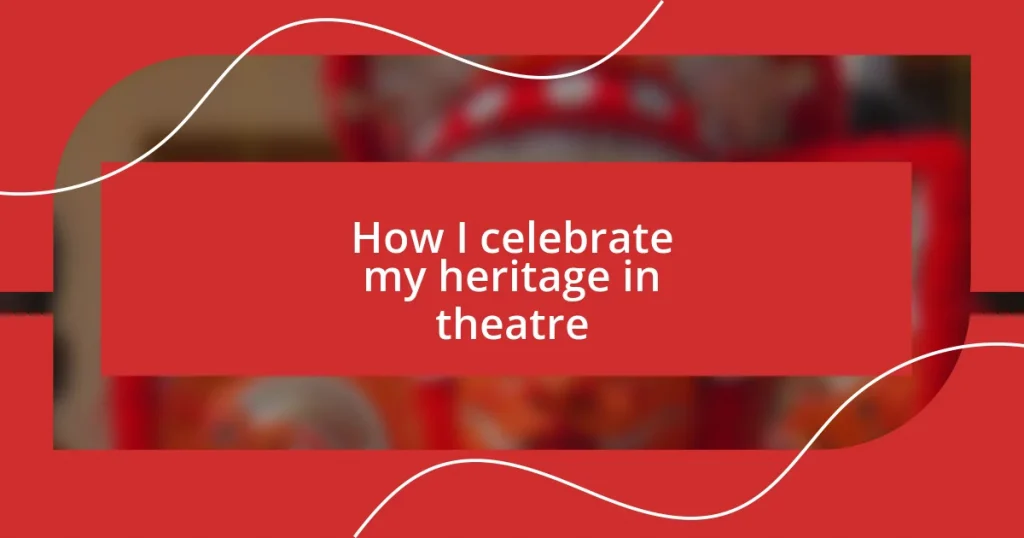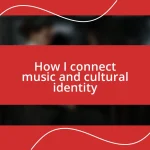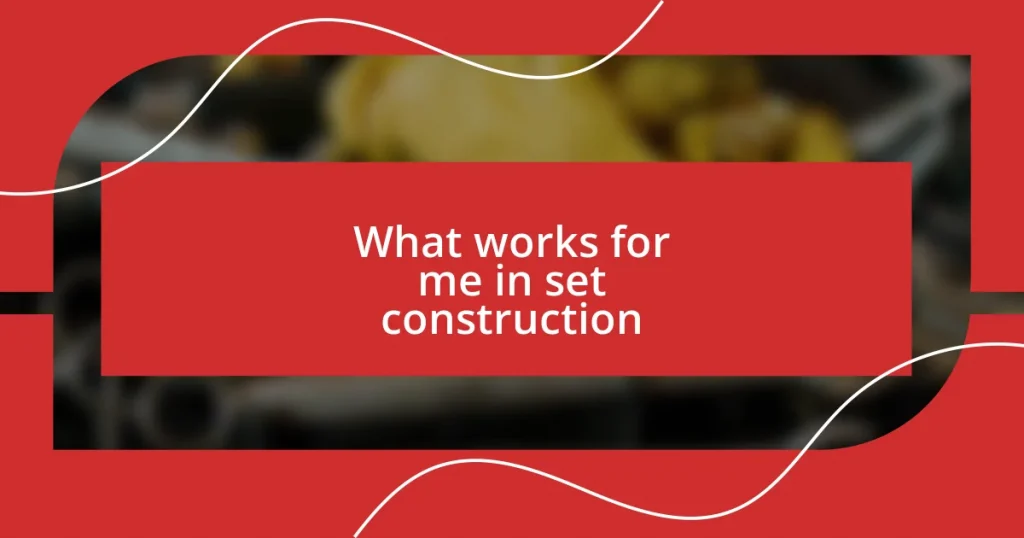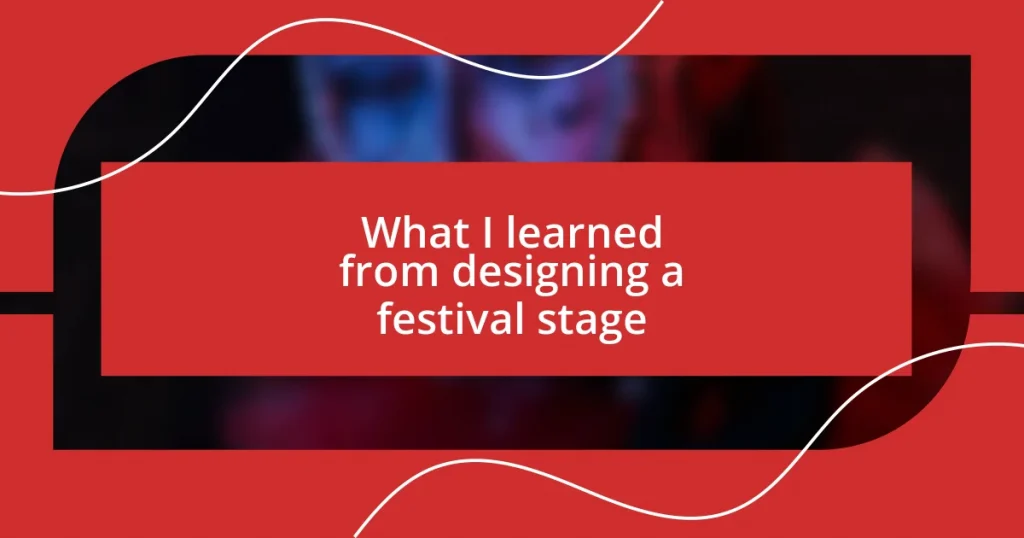Key takeaways:
- Embracing cultural roots enriches personal identity and influences creative choices in theatre, allowing for the celebration of heritage on stage.
- Engaging with community theatre groups fosters collaboration and helps to share diverse cultural narratives, especially through workshops and outreach programs.
- Hosting heritage-themed events and educating audiences through performances and discussions cultivates appreciation for cultural stories and promotes a sense of belonging.
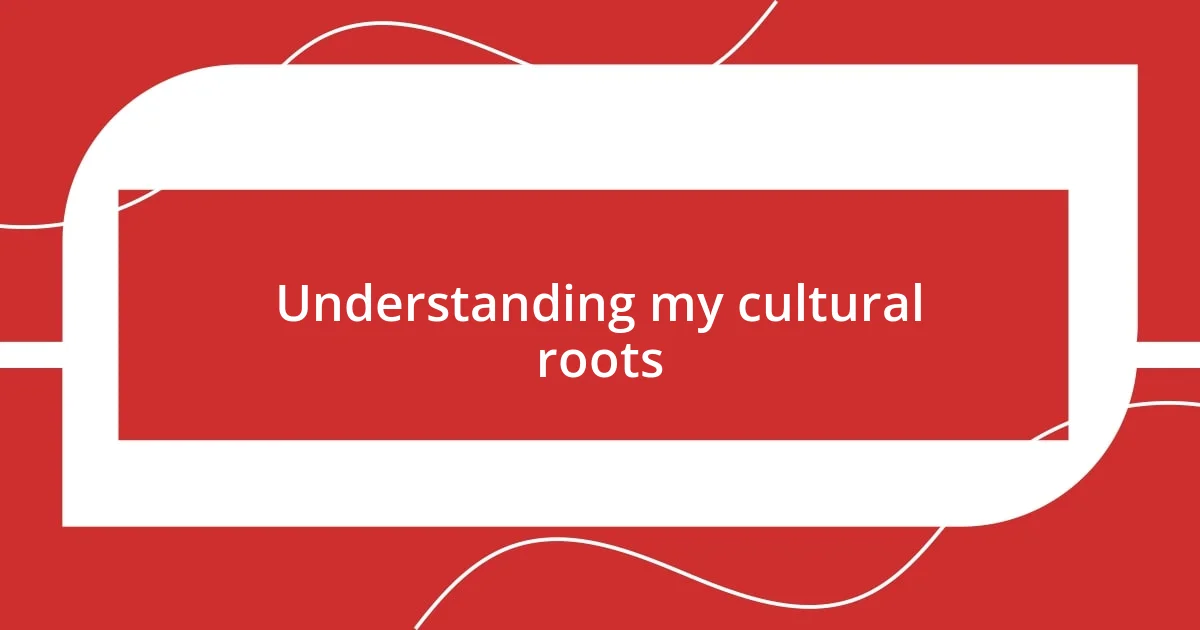
Understanding my cultural roots
Understanding my cultural roots is like unveiling layers of a complex tapestry. Each thread tells a story of my ancestors, their struggles, and triumphs. When I reflect on my family gatherings, I remember how stories were passed down through generations, often accompanied by laughter and tears. Isn’t it fascinating how these narratives shape who we are?
As I delve deeper, I can almost hear my grandmother’s laughter echoing through the years, especially when she shared tales of her childhood. The way she would animate her stories transported me to a different time and place, connecting me to the experiences that laid the foundation for my identity. Have you ever felt a similar connection to your heritage through the stories of your elders?
Embracing my cultural roots isn’t merely about nostalgia; it’s a vibrant part of my identity that influences my creative choices in theatre. I often find myself asking how such rich traditions can be expressed on stage. The more I explore, the more I realize that celebrating my heritage through theatrical expression allows me to honor my past while inviting others to experience the beauty of my culture.
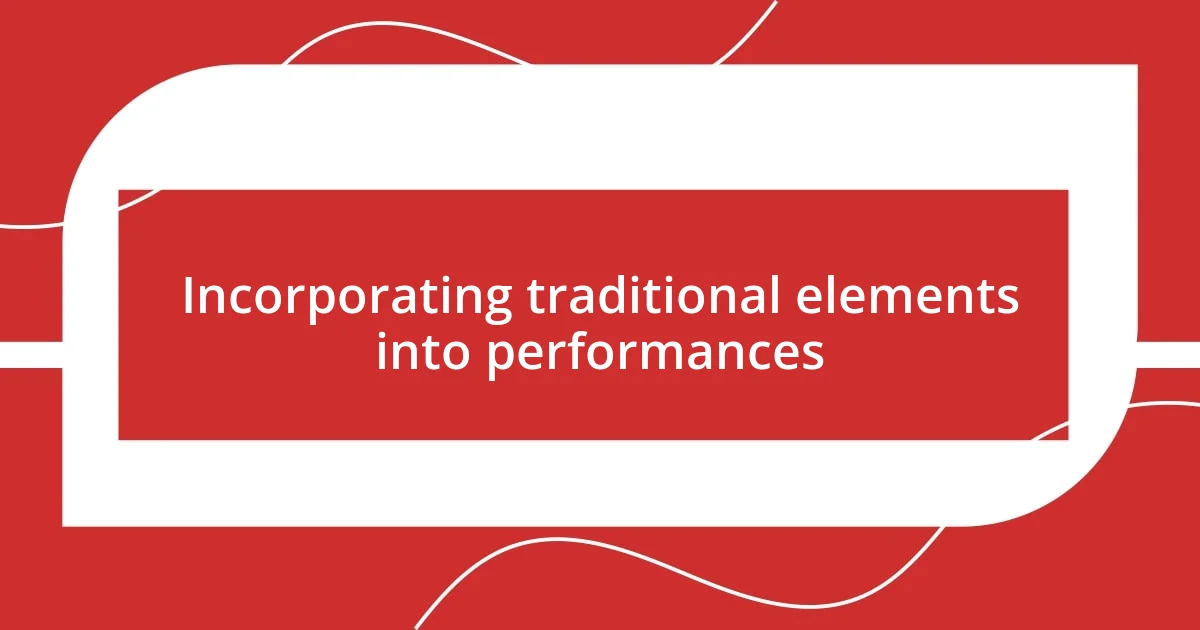
Incorporating traditional elements into performances
Incorporating traditional elements into my performances feels like breathing life into the stories that shaped my heritage. Each time I weave in music or dance that reflects my culture, I can feel the audience connecting to something deeper. Last year, during a local festival, I introduced a traditional dance to a modern play. It was magical to watch how the audience reacted—some even got up to join in, celebrating the moment with us.
One way to effectively integrate these elements is through:
- Authentic costumes that mirror the traditional attire of my ancestors.
- Musical pieces infused with folk sounds to evoke a cultural atmosphere.
- Traditional storytelling techniques, such as call-and-response, to engage viewers.
- Scenic designs that reflect significant symbols from my culture.
Each performance becomes a vibrant tapestry, connecting the audience to the roots of my heritage while also creating a shared experience for everyone involved.
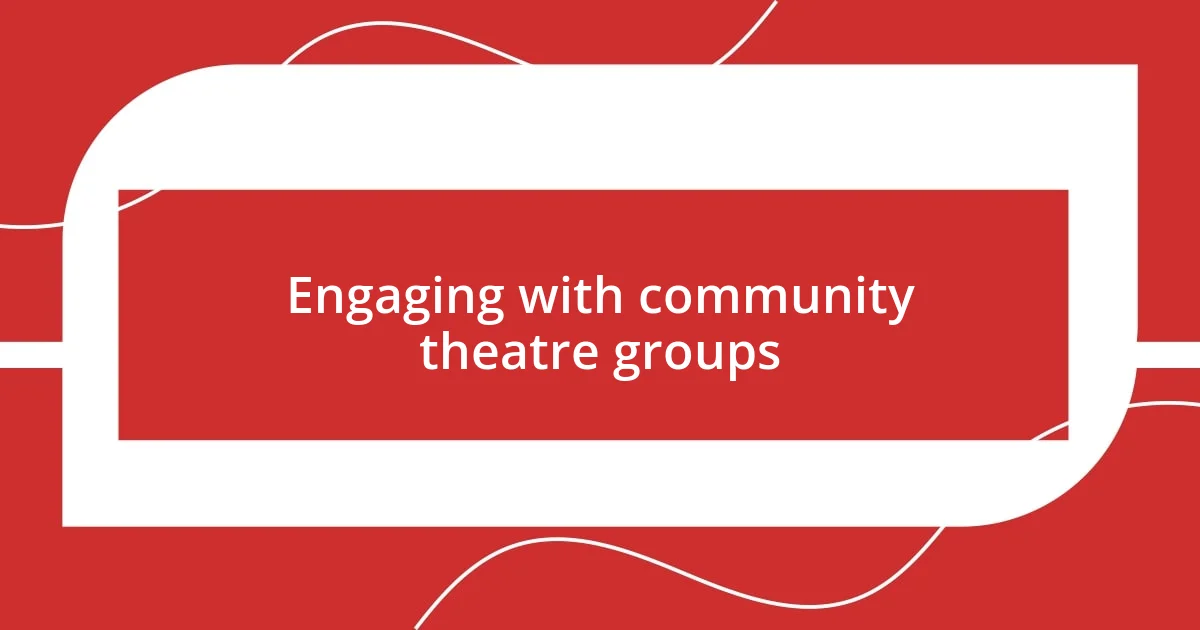
Engaging with community theatre groups
Engaging with community theatre groups provides an exciting platform to celebrate and share my heritage. I remember my first interaction with a local group; it was as if I stepped into a warm embrace filled with creativity. We came together not just to rehearse, but to exchange stories from our backgrounds, often sparking passionate discussions about how our diverse experiences could enhance our productions. Isn’t it incredible how theatre can connect people from all walks of life?
Participating in workshops often serves as a catalyst for deeper engagement. I vividly recall one session where we explored the rich traditions of various cultures, learning a traditional play from a fellow group member. The energy in the room was infectious, and I felt a sense of unity as we all contributed our unique perspectives to recreate cultural narratives on stage. This experience taught me the value of collaboration—when we pool our talents and heritage, the art we create becomes a beautiful fusion of voices.
I also cherish community outreach events. Volunteering with a group to perform at local schools really opened my eyes to the impact we can have on the younger generation. Sharing stories from my heritage led to lively conversations with students who were intrigued by the themes and characters we portrayed. It’s gratifying to see their eyes light up with recognition or curiosity, knowing that I’m helping to keep the stories alive for the next generation.
| Community Theatre Group Activities | Impact on Heritage Celebration |
|---|---|
| Workshops | Enhance understanding of various cultural narratives through collaboration |
| Performances | Showcase diverse heritage, fostering connection and engagement |
| Outreach Programs | Inspire younger audiences to appreciate cultural stories and themes |
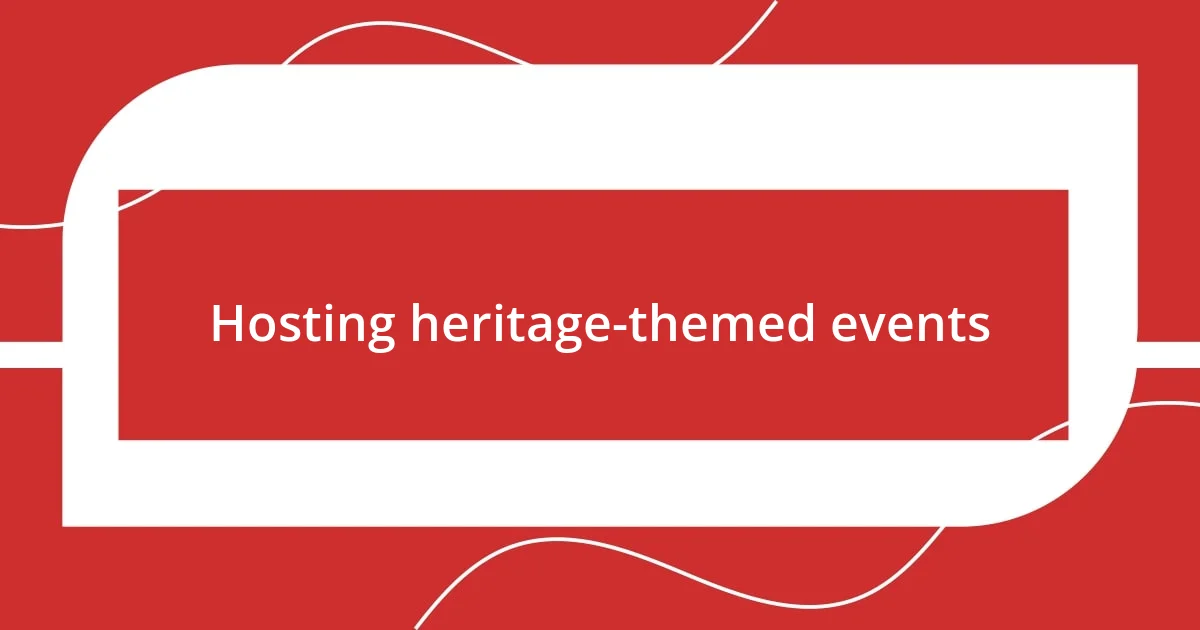
Hosting heritage-themed events
Hosting heritage-themed events has been one of the most rewarding experiences in my journey as a theatre enthusiast. I recall planning a cultural showcase where performers shared traditional stories through a blend of music and dance. The evening was electric with excitement; the air filled with laughter and applause as the audience joined us in celebrating our shared roots. Isn’t it fascinating how joy can radiate from simply being connected through art?
One particular event comes to mind—an open mic night dedicated to heritage tales. Each storyteller brought their unique background to the stage, creating an atmosphere that felt both inviting and intimate. I was amazed at how these narratives sparked connections among the diverse crowd. It was like witnessing a family reunion of sorts; strangers became friends as they nodded in understanding, occasionally chiming in with their own experiences. Have you ever been in a space where you felt an overwhelming sense of belonging just by sharing stories?
Through these gatherings, I’ve seen firsthand the power of celebrating cultural identity. Crafting experiences around traditional food, music, and narrative not only honors history but also fosters community spirit. I remember how one attendee approached me afterward, sharing how appreciative they were to finally see their culture represented on stage. Moments like these remind me that hosting such events is not just about performance; it’s about creating a safe space for exploration and belonging.
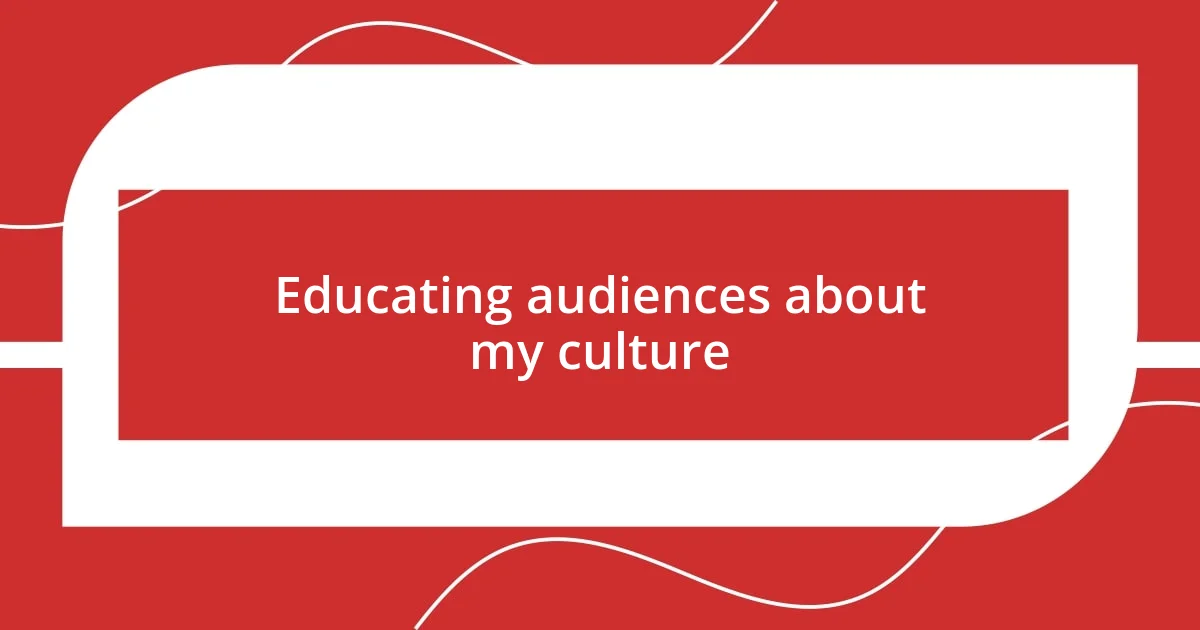
Educating audiences about my culture
Educating audiences about my culture happens in so many vibrant ways, often beginning with the stories we choose to tell on stage. I recall a production where I incorporated myths from my heritage—each performance sparked intriguing discussions with the audience afterward. Many expressed how they had never considered the rich layers of meaning behind those tales before. Have you ever realized that a single story can carry the weight of a culture’s history and values? That moment highlighted for me the responsibility of being a storyteller; it’s a chance to enlighten, engage, and foster understanding.
It’s fascinating how a well-placed cultural reference can ignite curiosity. During one performance, a young girl in the audience excitedly asked her parent about a traditional costume I wore. Afterward, that interaction became a beautiful opportunity for dialogue. I felt a wave of satisfaction—knowing that my portrayal sparked interest, inviting her to explore my heritage further. This connection is precisely why I love theatre: it transforms abstract concepts into relatable experiences, pulling audiences into the world I cherish.
I think about the power of post-show discussions, too. After one particular performance, we held a Q&A session, and the questions rolled in like the tide. “What does this tradition mean?” and “How has this story evolved over time?” were among the many inquiries. Each response felt like a bridge, connecting the audience to my culture. I remember smiling as I recounted how certain customs celebrate resilience and hope, values that resonate universally. Isn’t it incredible how sharing pieces of ourselves can cultivate appreciation and dispel misconceptions?










